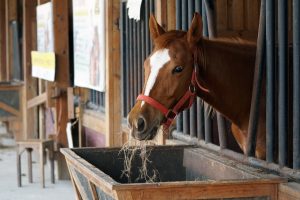 Your performance horse is an incredible athlete, and like any athlete, your horse’s nutrition plays a significant role in his ability to reach his full potential.
Your performance horse is an incredible athlete, and like any athlete, your horse’s nutrition plays a significant role in his ability to reach his full potential.
A performance horse’s diet should be tailored to the horse’s individual needs based on certain factors. For example, the type and frequency of training, current body condition, and lifestyle. Here are some common nutrition objectives to consider when feeding your performance horse.
Goals of Performance Horse Nutrition
When making decisions about your performance horse’s nutrition, there are some basic goals to keep in mind regardless of the type of work your horse is doing. These include considerations such as:
- Providing enough energy to sustain the workload.
- Maintaining appropriate body condition and muscle mass.
- Ensuring adequate forage intake for digestive tract health.
- Supplying all required nutrients and replenishing those lost during performance.
The products you feed your horse should achieve these goals through an appropriate balance of nutrients. The exact ratios of nutrients will vary between products. When deciding what products to give your performance horse, you’ll need to consider several components to determine whether it is right for your horse.
Energy
The energy, or caloric content, of the performance horse diet is a delicate balance. A balanced diet for your horse should provide enough energy to keep the horse in good condition and to fuel the horse for extended exercise. Assessing the amount of energy your performance horse requires will be the first step in choosing an appropriate feed or supplement.
Carbohydrates and fat are the most important sources of energy in a performance horse’s diet and are typically supplemented as part of the grain ration. All horses need these nutrients as part of a balanced diet, but the ratios required will vary depending on the type of work your horse is doing. Carbohydrates are the primary fuel for short, intense bursts of work, such as racing. Fats, on the other hand, provide sustained energy for endurance work such as eventing. Supplements could also help your horse maintain energy.
Forage
Forage is the mainstay of any equine diet, yet is sometimes overlooked. High-quality forage is not only important for the health and function of the equine digestive tract but also provides other essential nutrients such as protein and carbohydrates. Although most performance horses rely on grain supplementation to meet their energy requirements, recent research has suggested that even performance horses doing intense work can be maintained on a forage-only diet if a high-quality, high-energy forage is used.
Alfalfa and timothy hay are the most commonly used forages due to their palatability and availability. Alfalfa, in particular, offers a higher energy and protein content than many other forages. The types of forage available for your horse will vary depending on your geographic region, but it is most important to obtain a high-quality early cut. When traveling, be sure to bring plenty of your horse’s usual forage with you whenever possible to avoid abrupt dietary changes.
Protein
Performance horses with heavy workloads typically require slightly more dietary protein than horses with a less active lifestyle. Protein is needed to maintain muscle mass and promote recovery after exercise. However, feeding too much protein may result in health problems and decreased performance. It is recommended that horses receive about 8-12% crude protein depending on their workload. Keep in mind that protein does not just come from grain; high-quality hay often contains as much protein as the grain ration while also providing appropriate forage for the horse.
Fat
As a horse’s workload increases, the energy required to maintain that level of activity also increases. Horses with a moderate to high level of activity need more energy than can be provided by forage alone. Because of this, fat supplementation has become popular in many performance horse diets. A high-quality fat supplement, can provide additional calories to the feed, is highly digestible, and can also be a source of essential fatty acids. However, it takes time for horses to become adapted to fat supplementation, so gradual implementation is necessary.
Electrolytes
Electrolytes are especially important for performance horses. As a horse sweats during exercise, water, sodium, and chloride are lost from the body. If the horse becomes dehydrated, potassium may be lost as well. Ensuring adequate intake of these electrolytes both before and after exercise can support dehydration and promote water intake. Horses should always have free access to fresh water before and after exercise to maintain adequate hydration.
Choosing the Best Feeds and Supplements for Your Horse
Good nutrition is a complex subject and is especially crucial when fueling the performance athlete. There is no “one-size-fits-all” approach to performance horse nutrition, and your horse’s needs may change as his training advances. Your veterinarian is your best resource for more information on choosing an appropriate performance horse feed. By customizing your horse’s diet to meet his unique energy and nutrient requirements, you can help your horse be at his best no matter where he competes.
Kissimee Valley Feed carries several different feeds and supplements, as well as hay, for Performance Horses, including Purina, Triple Crown and Patriot. Visit one of our locations to find the perfect feed for your Performance Horse!
Article sourced from: vitaflex




